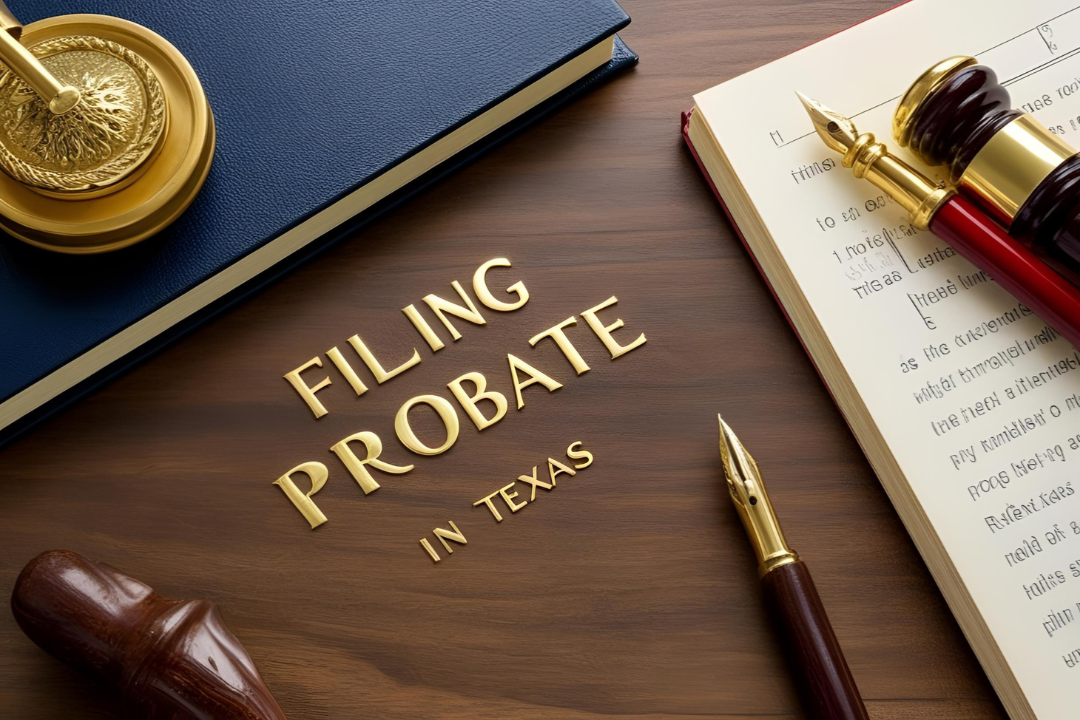
When someone passes away, their estate doesn’t automatically transfer to their heirs. In most cases, probate is required to validate the will, appoint an executor, and distribute assets. But what happens if probate isn’t filed? Who manages the estate? Can heirs still claim their inheritance, or will everything remain in legal limbo?
Texas law, governed by the Texas Estates Code, sets clear rules for handling estates. Failing to file probate based on these rules can lead to frozen accounts, unpaid debts, disputes among heirs, and so much more. So, let us explore what happens when this legal step is overlooked and why it’s crucial for a smooth estate transition.
When Probate is Required in Texas?
In the following cases, probate in Texas is required:
- If the person owned real estate, bank accounts, investments, or other property without co-owners or named beneficiaries, probate is required to transfer ownership legally.
- Texas allows a Small Estate Affidavit if the total value of the estate (excluding homestead and exempt property) is under $75,000. If the estate exceeds this amount, probate is likely necessary.
- If the deceased had a will, the probate court must authenticate it before the executor can distribute assets.
- If the deceased had unpaid debts or taxes, probate is required to ensure creditors are properly paid before distributing assets.
- If family members challenge the will or if there is uncertainty about heirs, probate helps settle these disputes.
How Long Do You Have to File Probate in Texas?
As per Texas Estates Code (256.003), a will must be admitted to probate in Texas within four years of the testator’s death. If the estate is not probated within four years, it may be treated as if the deceased died intestate (without a will), and the court will distribute assets according to Texas intestacy laws.
If the probate deadline is missed, the executor may lose the ability to act, and a court-appointed administrator may take over. The will may still be admitted as a muniment of title (Texas Estates Code 257.001) to transfer property, but only if there are no unpaid debts (except those secured by real estate).
|
Muniment of Title – It’s a way to legally transfer property without going through a long and expensive court process. |
Consequences of Not Filing a Probate
The consequences of not probating a will are as follows:
Frozen Bank Accounts and Inaccessible Assets
Without probate, financial institutions freeze bank accounts and investments, preventing heirs from accessing funds for bills, mortgage payments, or funeral costs. Even joint accounts may be affected if they lack clear survivorship rights.
Real Estate Ownership Issues
Property titles remain unclear, making it impossible to sell or transfer ownership. Over time, this can result in a tax lien, IRS penalties, foreclosure, or a clouded title, complicating future sales and making it harder to liquidate assets.
Delaying probate can lead to serious legal issues. Get help from our probate attorney before problems arise.
Legal Actions from Creditors
Creditors have the legal right to collect debts from a deceased person’s estate. If probate is not filed, these debts do not simply disappear. Instead, creditors can file lawsuits against heirs or place liens on estate assets, preventing any future sales or transfers. Interest and penalties continue to grow increasing financial burdens on surviving family members.
Family Disputes and Legal Battles
Without probate, verbal agreements mean nothing in court. Family members may argue over assets, leading to expensive and lengthy lawsuits. If no will exists, Texas intestacy laws dictate asset distribution, which may not align with the deceased’s wishes.
Delayed or Lost Insurance and Retirement Benefits
Certain inheritance claims, insurance benefits, retirement funds, and legal settlements have strict deadlines that require probate documentation. If these deadlines are missed due to delays in filing probate, heirs may permanently lose their right to claim these funds. This is especially true for wrongful death settlements and other time-sensitive financial claims.
Decreased Estate Value
When assets like real estate, vehicles, or businesses remain tied up due to probate delays, they can lose value. A home left unoccupied may fall into disrepair, unpaid property taxes may lead to tax liens, and market conditions may reduce the value of business assets. The longer probate is delayed, the more financial losses heirs may face, such as complications with capital gains taxes on inherited property.
Dependents Could Lose Their Home
Probate appoints guardians for underage or incapacitated heirs. Without it, they may be left without financial support or legal oversight. Further, surviving spouses and dependents may struggle to claim homestead exemptions and family allowances, leading to foreclosure or eviction risks.
Increased Risk of Fraud and Theft
Without the legal oversight of probate, dishonest individuals may take advantage of the situation and unlawfully claim assets. Fraudulent transfers, forged documents, and mismanagement of property can go unnoticed, making it harder for rightful heirs to reclaim what was stolen. If fraud is discovered years later, recovering lost assets can require expensive and time-consuming legal action.
Benefits of Working with a Probate Attorney
Here are some key benefits of working with a probate attorney:
- Ensures Will Validity: A probate attorney verifies if a will meets Texas Estates Code 251.051 requirements and addresses concerns like fraud or undue influence.
- Prevents Costly Errors: They ensure executors follow probate laws, file documents correctly, and avoid financial liability.
- Manages Estate Taxes: Legal guidance helps minimize tax burdens and prevent IRS penalties for estates exceeding federal exemption limits.
- Handles Complex Estates: Attorneys can also determine if the estate qualifies for a simplified probate process in Texas, such as a Muniment of Title (Texas Estates Code 257.001) or a Small Estate Affidavit (Texas Estates Code 205), which can speed up property transfers.
- Protects Special Needs & Minor Beneficiaries: They establish trusts or guardianships for a minor child or a beneficiary with special needs to secure inheritances without affecting government benefits.
Get Reliable Probate Guidance in San Antonio!
Looking for trusted legal guidance on probate matters? At Mazurek, Belden & Burke, P.C., our licensed attorneys with years of experience in probate planning provide clear, practical solutions to help you navigate the probate process with confidence. Whether you need assistance understanding misconceptions about probate in Texas, exploring alternatives to probate, or ensuring a smooth estate administration, we are here to help. Avoid unnecessary delays and legal complications—contact us today for personalized legal support from a probate attorney in San Antonio.
